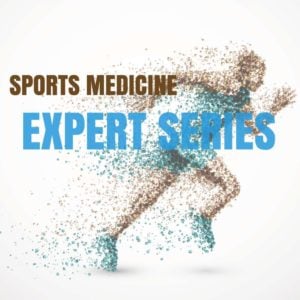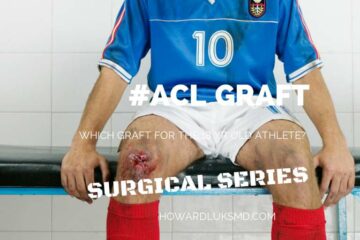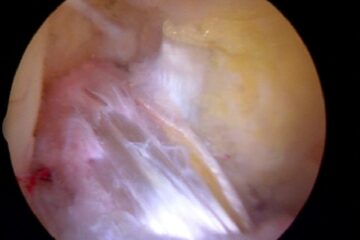
The parents of an ACL injured athlete faces many challenging choices.
- Is ACL surgery necessary?
- Which ACL surgery technique best suits my child’s needs?
- When can they return to sports after ACL surgery?
In our Expert Opinion series on ACL injuries we have covered many of these questions from the viewpoint of the Orthopedic Surgeon.
- Who should consider ACL Surgery?
- Which graft choice is most appropriate for ACL surgery
- When do your athletes return to sports after ACL Surgery?
Many of you have posted follow-up questions you would like addressed on our #HomeTeam site and I ask you to continue. This helps us serve your needs!
A Straightforward Diagnosis ~ Five Professional Opinion series:
Care of An ACL Injury in a Student Athlete
This is the first post in a series of 5 from true experts in the evaluation and management of our ACL injured athletes. Our Physical Therapy and Athletic Trainer colleagues see these athletes before the surgeon evaluates them, and after the surgeon treats them. These professionals have the most important task at hand. They need to prepare the athlete for ACL surgery, and then they must rehabilitate the athlete before returning them to the playing field. They arguably have the most important task since they are interfacing with the athlete far more often then the surgeon. They will spot issues that are arising and start the process to remedy them to help the athlete achieve their goal of a safe return.
Because our Physical Therapy and Athletic Trainer colleagues interface so often with athletes, they are in a great position to address our first question:
When Considering ACL Surgery: How Do We Choose an Orthopedic Surgeon?
J.E. : “Are all Orthopedic Surgeons considered equal”?
No, definitely not. Just like all PTs shouldn’t be treated the same with ACL rehab. Generally, you want to look for a couple of things starting with a surgeon who specializes in Sports Medicine and specifically knees.
You want someone who…
…does a high volume of ACLs per year (well over 100 is a good starting point). They tend to know a variety of surgical techniques to BEST FIT the patient.
…is consistently on top of the latest research and best practices in terms of graft selection, technique, and understanding of best rehab practices. This is constantly evolving as we continue to gain more knowledge.
…is interested in what is best for YOU. Takes the time to understand what you are trying to get back of in terms of activity, sport,and sport (position) demands. A one size fits all strategy is not a good one! These surgeons also tend to be a lot more proactive in terms of communication with the rest of the team (Physical Therapy, Athletic Trainers, etc.) and also lead to a safer and more effective return to play.
….low infection rate and low revision/reinjury rate
I have far fewer problems in terms of post-surgical pain and post-surgical complications with these types of surgeons. And coupled with a PT who fits a similar description, the rehab goes much smoother and athletes return to sport with significantly less long term problems and a more effective performance upon return to play.
S.C. : For the majority of my career, I have had the fortune of working with a major orthopedic center well known for its research on ACL surgery and outcomes. As a result, our surgeons have an excellent track record. While the technical capability of the surgeon is an essential part of a successful patient outcome, I firmly believe that the rehabilitation is equally – if not more – important. I do recommend patients to particular surgeons because of their reputation and experience with ACL reconstruction. In my opinion, this reduces the likelihood of complications (for example, range of motion block due to poor graft placement) and increases the likelihood that other related factors are addressed during surgery (for example, meniscal repair when indicated instead of meniscectomy).
T.N. : Throughout my 17 year career as a physical therapist, I have been blessed with the opportunity to practice throughout the country. That said, I am not a surgeon nor do I profess to know what it takes to be good surgeon versus a superior surgeon. However, I have been honored to work with a wide variety of surgeons with varying levels of experience, a variety of approaches and varying techniques. All of them have their merits and are skilled practitioners. But, as a physical therapist, when it comes to rehabilitating the ACLR patient, we do see a variety of outcomes among physicians. Just like there are physical therapist that have better outcomes, there are also surgeons who have better outcomes especially when it comes to ACLR patients. Based solely on my experience, what I tend to see four common factors among surgeons who have better outcomes.
1. Empathy – this tends to present itself in several different ways but most importantly that they listen to the patient. This is critical for the optimal outcome and the patient experience. Those who possess will tend to want to educate the patient and the family on what is expected and the process. As one surgeon commonly says “If this were my daughter, this is what I would do”. In essence they treat you like family or your child as if they would their own. This results in them not only educating to elevate fears but also in setting realistic expectations in a way that is comforting and not devastating. They are also approachable when patients have to ask the hard questions or post-surgical problems arise. They do not become defensive or evasive. I also tend to believe that it is this empathy that also drives them to want to be the best at what they do for their patients and hence constantly drive to hone their skill. Most importantly or just as importantly, this adds to a positive patient experience. The psychological impact of the patient’s experience plays a key role in the patient’s motivation with recommendations, perception of progress, confidence in the surgeon and ultimately drives the final outcome achieved. How do I know if my surgeon has empathy? What does your gut tell you after your visit? Do you feel good about the experience, did you like your physician and did you feel like he listened to you? How is their bed side manner? Do you feel well informed? What kind of reviews have they gotten online and by your insurance company? If you know someone that has used them, what is their frank feedback?
2. Volume – to quote Einstein “Only one who devotes himself to a cause with his whole strength and soul can be a true master. For this reason mastery demands all of a person.” To master a skill requires a constant pursuit of excellence and practice. I don’t want to pretend to understand what it takes to be a master surgeon, but what I do know is that to master any skill requires practice, practice, practice. To master the art and complexity of Brazilian Jiu-Jitsu, for example, takes 10-15 years and hours and hours of practice in a day. When applying that analogy to orthopedic surgery and especially ACLR and when considering the complexity of the human body, the complexity of the surgery and biomechanics, to master this skill requires a lot of practice. The master always has some innate level of skill that only some have but a master never becomes the master or gains their full potential unless they practice. Unfortunately in this business, this means lots of volume or lots of ACLR surgeries. How do I know if my surgeon has that experience? Look at their resume or CV online. What does their clinical bio say? Do they list ACLR as one of their specialties? Ask them how many ACLR they do a week, a month or a year? Do they have any specialty training (sports medicine fellowship)?
3. Evidence based practice – most surgeons will be well versed in the research but few are leaders and innovators in the research. Sadly, so much of what is published today in the literature will take 5-10 years before it becomes as standard of practice. To be the standard of practice means that it is adopted by the majority of those practicing and hence what is the norm. Do we want the norm in our outcomes or superior? Innovators in the field tend not to be just well versed in the research but follow it closely, dissect it for clinical applications to their clinical setting and become the earliest adaptors of the most clinically sound research techniques and protocols. Many times they are also the innovators in education on the topic (papers, articles, blogs, conferences), in the research (doing research and publishing papers related to the topic) or driving the education in their field (through teaching conferences for their colleagues or educating future surgeons in medical school or fellowships). How do I know if my surgeon practices evidence based practice? Look at your surgeons CV or bio. Do they list any papers they presented or research they have done on the subject? Do they list any specialty conferences, books or scientific committees they presented at related to ACLR? Have they be sought out as an expert in this particular area? Ask them what the current research says in this area and how they approach.
4. Great surgeons believe in great physical therapy – I am not saying this just because I am a physical therapist but because great surgeons also know that great physical therapy is a critical component to achieving the optimal outcome. Great surgeons know the right therapists in their area to aid them in achieving optimal outcomes.
Keeping in mind I am not a physician but when I am looking for a surgeon, this is some of the things I recommend when looking for the right surgeon for my ACL deficient patient.
A.G. : There are many different recipes to cook Lasagne, just like there are many different ways to reconstruct an ACL. Graft preference and graft placement by the surgeon are two differences that can have a great impact on whether your ACL surgery will be successful. Some surgeons prefer allografts to become your new ACL. The recovery is said to be less painful and the patient is usually back to feeling normal quicker than with an autograft; however, research shows that allografts have a higher failure rate especially in young and/or highly active individuals. Graft placement is equally if not more important. Many surgeons, even those who have the impressive subtitle “Sports Medicine” on their business cards still use a transtibial approach when placing the new ligament. This is an older technique that results in a more vertical graft position which can result in ongoing rotational instability. With that said I am a firm believer that not all orthopedic surgeons are created equally in regards to ACL reconstructions. Many orthopeadists only do a few ACLs a year, and like everything else in life, practice makes perfect. If the 18 year-old female were one of my student athletes I would highly encourage her to find a surgeon who fixes multiple ACLs each week and who will reconstruct her ACL in an anatomical position using an autograft. In my opinion volume (quantity) definitely matters, but it has to go hand in hand with quality.
J.D. : Are all Ortho surgeons created equal? – Absolutely NOT! If you have to have an ACLR you want an Ortho that does a high volume of reconstructions per year. These are the docs that are up to date on current graft types and surgical procedures. You want to ask and know about their outcomes as well.
My thoughts:
All orthopedic surgeons are not experts in all procedures. That would be an impossible task. Can a less experienced surgeon perform an ACL reconstruction properly? Yes, but not as reliably or as often as a surgeon who performs a certain number of ACL surgeries each month. Volume matters. As does technique and talent. This is not meant to say that all high volume surgeons are great as well. Being treated by a high volume ACL surgeon simply improves your chances of having a successful procedure and returning to the ball field.
Thank you to our experts:
Julie Eibensteiner : @laurusrehab : Website Prior posts on this blog : here
Trent Nessler : @ACL_Prevention : Website ,blog Prior posts on this blog : here
Sylvia Czuppon : @czuppons : Website
Anja Goebel : @ACL_not_again
Darin Padua: @DarinPadua : Website
Jesse Dimick : @Jdimick : Website
















Thanks for the tips! I’ve been having trouble finding a good orthopedic surgeon lately. These tips should help me find the right surgeon to help with my condition. I really liked what you had to say in tip #4. It seems like the right surgeons would care about how well their patients recover from surgery. It’s very helpful to know that a good surgeon would recommend the best physical therapists to help their patients recover from surgery in the best way possible.
Thanks Deanna
If you’re looking for an orthopedic surgeon to do your ACL surgery, it makes sense to find someone that performs that specific surgery a lot. I’m not sure how comfortable I’d be with picking someone that only does it a handful of times every year. I’d be a lot more trusting if they perform it over a hundred times, like you had mentioned.